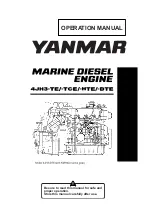
Maintenance Section
-133-
Fuel Specifications
General Fuel Information
Use only fuel as recommended in this section.
NOTICE
Fill the fuel tank at the end of each day of
operation to drive out moisture laden air and to
prevent condensation. Maintain a constant level
near the top of the day tank to avoid drawing
moisture into the tank as the level decreases.
Do not fill the tank to the top. Fuel expands as it
gets warm and can overflow.
Do not fill the fuel filters with fuel before
installing them. Contaminated fuel will cause
accelerated wear to the fuel system parts.
Drain the water and sediment from main fuel
storage tank before it is refilled. This will help
prevent water and/or sediment from being pumped
from the fuel storage tank into the engine fuel tank.
Diesel Specifications
Fuel Types
DAEWOO Diesel Engines have the ability to burn a
wide variety of fuels. These fuels are divided into
two general groups, preferred and permissible.
The
Preferred Fuels
provide maximum engine
service life and performance. They are distillate
fuels. They are commonly called diesel fuel, MDO
diesel, furnace oil, gas oil or kerosene (for cold
weather operation).
Experience has proven that distillate fuels meeting
the following basic specifications will result in
optimum engine performance and durability.
DAEWOO strongly encourages the use of fuels that
meet the Preferred Fuels specification.
The permissible fuels are crude oils or blended
fuels. Use of these fuels can result in higher
maintenance costs and reduced engine service life.
Crude oil is used to describe oils/fuels that are not
refined and are in the original state as when
pumped from the ground. Certain types of crude
oils can be burned in DAEWOO Engines.
PREFERRED DISTILLATE FUEL
FOR DISEL ENGINES
Specifications Requirements*
Aromatics (AST D1319)
35% Max.
Ash (ASTM D482)
0.02% Weight Max.
Cetane Number
(ASTM D613)
35Min. for 45 max.
40 Min. for DI Engines
Could Point (ASTM D287)
Not Above Lowest Expected
Ambient Temperature
Gravity API (ASTM D287)
30 Min. and 45 Max.
Pour Point (ASTM D97)
6°C (10°F) Below Ambient
Min.
Sulfur (ASTM D2788,
D3605 or D1552)
0.5% Max.
(See Sulfur Topic)
Viscosity, Kinematic @
38°C (100°F) (ASTM D445)
20.0 cSt Max.
1.4 cSt Min.
Water & Sediment
(ASTM D1796)
0.01% Max.
*As delivered to fuel system
Fuel Sulfur Content
The percentage of sulfur in the fuel will affect the
engine oil recommendations. Fuel sulfur is
chemically changed during combustion to form both
sulfurous and sulfuric acid. These acids chemically
attack metal surfaces and cause corrosive wear.
Certain additives used in lubricating oils contain
alkaline compounds that are formulated to
neutralize these acids. The measure of this reserve
alkalinity in lubricating oil is known as its Total Base
Number (TBN). TBN is essential to neutralize the
acids from combustion gases and to minimize
corrosive wear.
Any API classification performance of oil should
have sufficient TBN for fuels with less than 0.5%
sulfur. For fuels with 0.5% to 1.5% sulfur by weight,
engine oil must have a TBN of 20 times the
percentage of fuel sulfur as measured by the ASTM
(American Society of Testing Materials) D-2896
method. (ASTM D-2896 can normally be found at
your local technological society, library or college).
















































